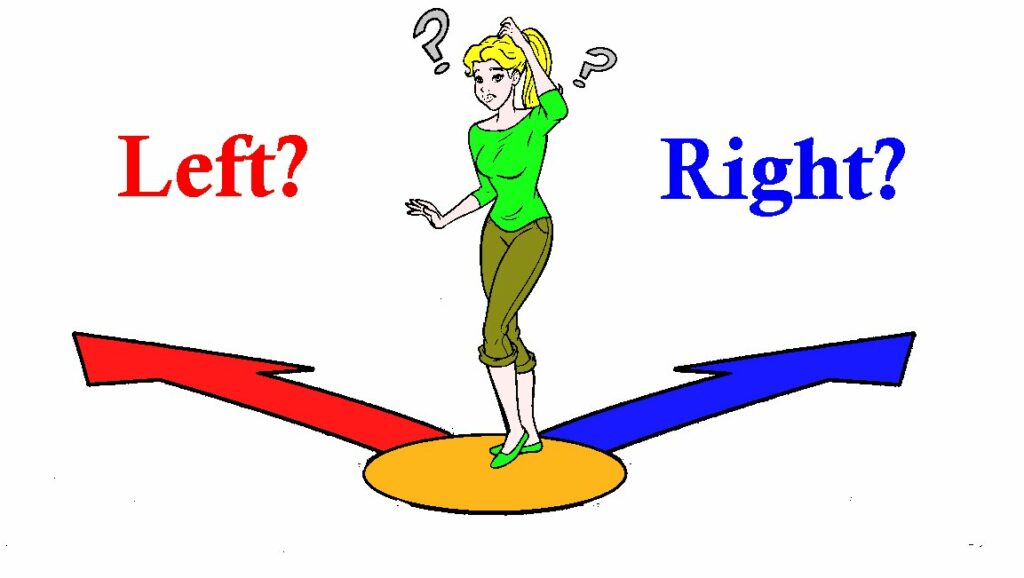
The media describe politicians as from the “Left” or “Right”, but do you know why we call them left or right?
Well, recently a teacher contacted me to say that she had been asked to explain the difference between Left and Right in politics to her class, she asked me if I could send her some words on it.
This is what I sent her.
The French Revolution.
You can blame it all on the French Revolution in 1798 as this is where we first heard of the Left and Right.
As a result of the revolution the Le Chambré de Deputies (Chamber of Deputies), which was their parliament, was changed. Before the revolution it had a very restrictive membership, basically, just the aristocracy and landowners, nobody else was allowed to attend.
A new Chambré de Deputies.
With the arrival of the French Revolution a new Chamber of Deputies was put together, to allow everybody to attend.
Well, not everybody as that would have been chaotic, therefore they got all the different revolutionary groups to nominate people to attend. The argument being that it was now hearing views from all levels of society, but once in place it was chaotic! To explain it would fill several books, in fact, I think they already have!
Now that all these different people could attend, this meant that, of course, the monarchists could, and they found multiple ways to become members. In the end they amounted to nearly one third of the representatives.
The Monarchists arrive.
Being supporters of the King, the Monachists, who at Royal events had always sat to his right, therefore, unthinkingly, as they entered the chamber they went and sat on the right. This led the revolutionaries to call them “the right”.
The Revolutionaries.
This inevitably meant that the revolutionaries, who hated everything about the monarchy and the aristocracy, sat opposite them on the other side of the chamber, the left. Ostensibly they sat there so they could throw rotten tomatoes and other more dangerous things at monarchists. The result was that they were called the left, and again it has stuck.
The evolution.
Over the years, due to industrialisation, politics became a fight between the workers and the owners, and it became inevitable that these descriptions continued with the workers becoming the left and the owners the right.
Then as the workers formed trade unions to represent them against the hard working conditions in the late nineteenth century, it was inevitable that they would describe themselves as the left, as they felt they were the revolutionaries of their time.
That has continued until today, where those fighting to help workers are still classed by the media and politicians as from the left.
I hope this helps.
Isn’t history interesting?
10 questions to discuss:
- Beyond the French Revolution, were there any earlier historical events or ideas that contributed to the development of “left” and “right” terminology in politics?
- How accurate is it to say that “left” always represents workers and “right” always represents owners? Are there any historical or contemporary examples that contradict this simplification?
- Do you think the spatial terms “left” and “right” are helpful or harmful in understanding political ideologies? Why or why not?
- The blog focuses on Europe, particularly France. How have the terms “left” and “right” evolved in different parts of the world, and are there significant differences in their meaning?
- How do other political spectrums such as libertarian-authoritarian or progressive-conservative compare and contrast with the “left-right” spectrum?
- Can “left” and “right” be used to describe individual politicians or policies accurately, or are these terms too broad and overgeneralized?
- What are some of the limitations or dangers of using labels like “left” and “right” in political discourse?
- Are there alternative ways to categorize or understand political ideologies beyond the “left-right” binary? If so, what are they?
- How can individuals avoid being pigeonholed by “left” or “right” labels and think critically about political issues?
- The blog mentions the media using these terms. How do you think journalists and media outlets can be more responsible in representing diverse political views and avoiding reinforcing simplistic “left-right” narratives?
These questions encourage deeper engagement with the blog’s content and promote critical thinking about the limitations and complexities of using “left” and “right” in political discourse.
For more information on this click below:
http://factmyth.com/the-origin-of-the-political-terms-left-and-right/
©Tony Dalton

